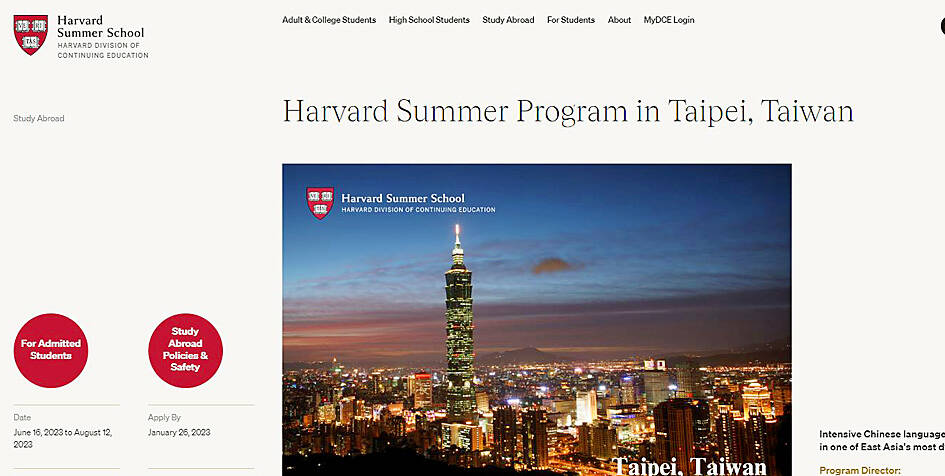Sixty students from the US have begun their study at the Harvard Taipei Academy to study Mandarin and Taiwanese culture following the closing of the Harvard Beijing Academy in 2020.
Cooperation between Harvard University and Beijing Language and Culture University was terminated three years ago due to escalating US-China tensions.
The program was changed so that students from Harvard University, Yale University, Princeton University and the University of Pennsylvania would instead come to Taipei for the study of Mandarin and cultural exchanges.

Photo: Screen grab from Web site
The Harvard Taipei Academy was originally scheduled to be launched in 2020, but the program was postponed to this year due to the COVID-19 pandemic, the Office of International Affairs at National Taiwan University said.
The program, which started on Friday, enrolled 60 students from Harvard, Yale, Cornell, the University of Pennsylvania and Williams College, the office said.
The students can improve their language skills through intensive Mandarin courses, as well as experience the beauty of Taiwan through cultural experience courses and off-campus visits, it said.
They are to carry out field research outside of Taipei to learn about Taiwanese customs and culture, it said.
Over weekends, students can go on excursions to cultural and historical landmarks and conduct exchanges with local students in “interest groups,” it said.
Through these interactions, local students would also be able to broaden their international horizons and connect with the world, it said.
The office thanked the Ministry of Education, the Ministry of Foreign Affairs and the Harvard Club of the Republic of China for their administrative and financial support.
Meanwhile, National Chengchi University (NCCU) has signed a memorandum of cooperation with Purdue University to promote teaching and research cooperation in science and technology diplomacy.
NCCU Department of Business Administration professor Lo Ming-shiow (羅明琇) signed the memorandum with Krach Institute for Tech Diplomacy at Purdue CEO Michelle Giuda on Friday, NCCU said in a press release yesterday.
Representative to the US Hsiao Bi-khim (蕭美琴), Purdue University president Mung Chiang (蔣濛) and former US undersecretary of state and cofounder of the institute Keith Krach witnessed the signing, it said.
“Our growing partnership will help accelerate the innovation and adoption of trusted technology and the cause of freedom,” the institute said on Twitter.
The cooperation goes beyond the inter-school level, connecting the national policy development of Washington on the US east coast and the high-tech resources in Silicon Valley on the west coast, NCCU said.
The program is also an important milestone for NCCU, as it is the first time it joined the global supply chain and technology security alliance with its expertise in humanities and social sciences, it said.
Interdisciplinary research and training in science and technology diplomacy are particularly critical, as US-China relations are tense and Taiwan has a pivotal strategic position in the Asia-Pacific region, NCCU said.
NCCU’s research expertise in geopolitics, international relations and supply chains, as well as resources in the industry, government and academia, made it the best choice for cooperation, it said.
The two sides are to launch cooperative projects in teaching and research related to global supply chain resilience, and professional training in science and technology diplomacy, as well as publish policy white papers and case reports, it said.

The Grand Hotel Taipei on Saturday confirmed that its information system had been illegally accessed and expressed its deepest apologies for the concern it has caused its customers, adding that the issue is being investigated by the Ministry of Justice Investigation Bureau. The hotel said that on Tuesday last week, it had discovered an external illegal intrusion into its information system. An initial digital forensic investigation confirmed that parts of the system had been accessed, it said, adding that the possibility that some customer data were stolen and leaked could not be ruled out. The actual scope and content of the affected data

‘LIKE-MINDED PARTNER’: Tako van Popta said it would be inappropriate to delay signing the deal with Taiwan because of China, adding he would promote the issue Canadian senators have stressed Taiwan’s importance for international trade and expressed enthusiasm for ensuring the Taiwan-Canada trade cooperation framework agreement is implemented this year. Representative to Canada Harry Tseng (曾厚仁) in an interview with the Central News Agency (CNA) said he was increasingly uneasy about Ottawa’s delays in signing the agreement, especially as Ottawa has warmed toward Beijing. There are “no negotiations left. Not only [is it] initialed, we have three versions of the text ready: English, French and Mandarin,” Tseng said. “That tells you how close we are to the final signature.” Tseng said that he hoped Canadian Prime Minister Mark Carney

POSITIVE DEVELOPMENT: Japan and the US are expected to hold in-depth discussions on Taiwan-related issues during the meeting next month, Japanese sources said The holding of a Japan-US leaders’ meeting ahead of US President Donald Trump’s visit to China is positive news for Taiwan, former Japan-Taiwan Exchange Association representative Hiroyasu Izumi said yesterday. After the Liberal Democratic Party’s landslide victory in Japan’s House of Representatives election, Japanese Prime Minister Sanae Takaichi is scheduled to visit the US next month, where she is to meet with Trump ahead of the US president’s planned visit to China from March 31 to April 2 for a meeting with Chinese President Xi Jinping (習近平). Japan and the US are expected to hold in-depth discussions on Taiwan-related issues during the

President William Lai (賴清德) yesterday bestowed one of Taiwan’s highest honors on Saint Vincent and the Grenadines (SVG) Ambassador Andrea Clare Bowman in recognition of her contributions to bilateral ties. “By conferring the Order of Brilliant Star with Grand Cordon on Ambassador Bowman today, I want to sincerely thank her, on behalf of the Taiwanese people, for her outstanding contribution to deepening diplomatic ties between Taiwan and SVG,” Lai said at a ceremony held at the Presidential Office in Taipei. He noted that Bowman became SVG’s first ambassador to Taiwan in 2019 and